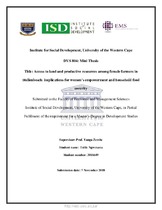| dc.description.abstract | Women play an important role in food security. Growing, processing, purchasing, preparing and
serving food to their families is a common and distinctive relationship they have to food in most
societies in the world. They also play a critical role in food security. Yet, studies show that
women are the most vulnerable to household food insecurity. At the heart of women’s
differential vulnerability to household food insecurity is their lack of ownership of the means of
food production, mainly land. Food is grown on land and access to land for productive purposes
is vital for food security, especially for women who have little other means of securing food
aside from performing subsistence farming for household food security. Thus, analyzing women
experiences of accessing land and productive resources, and the manner in which such access
shapes their empowerment and ability to achieve household food security is important. In this
dissertation, women’s empowerment refers to a process where women gain the ability to make
strategic life choices; I take the position that for women to be empowered, their access to
resources, individual capacities and agency must be improved. Thus, this dissertation aims to
examine the lived experiences of female farmers in Stellenbosch in terms of access to land and
productive resources, and the implications this kind of access has for women’s empowerment
and household food security. | en_US |

